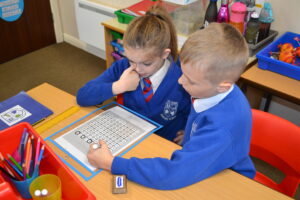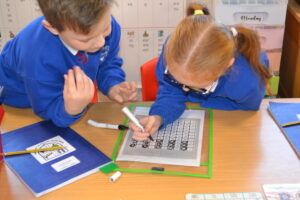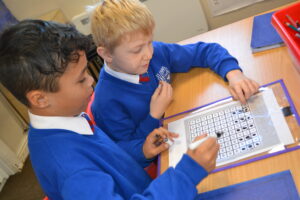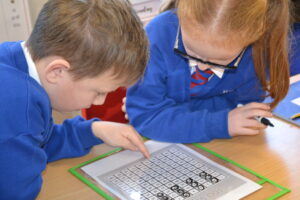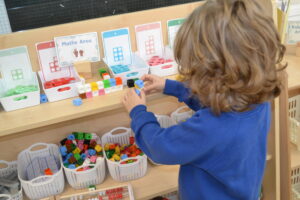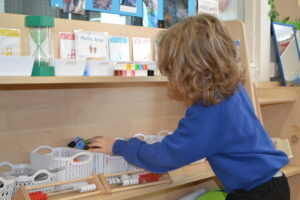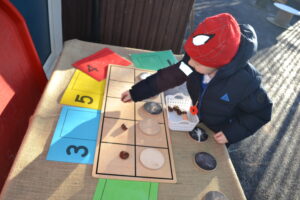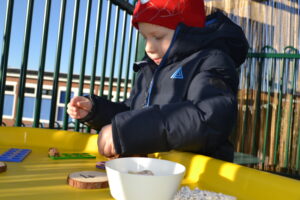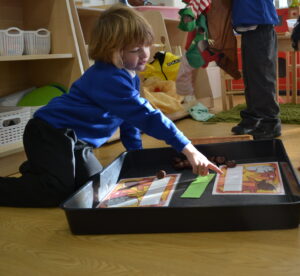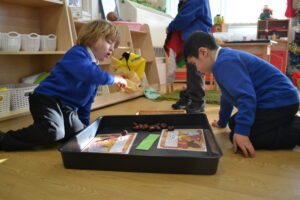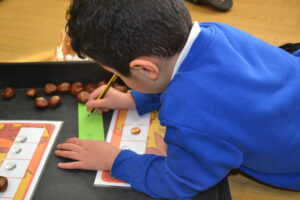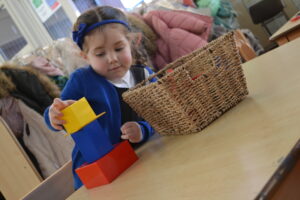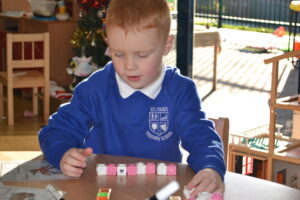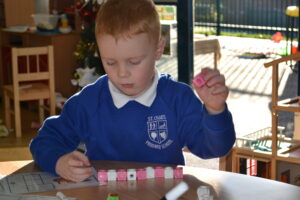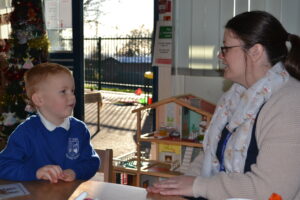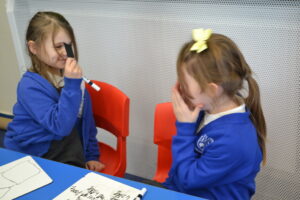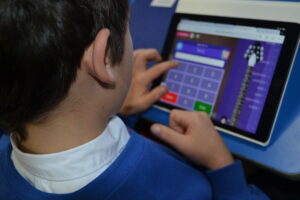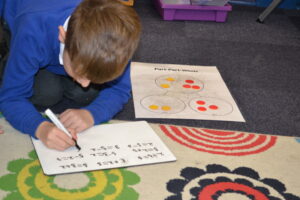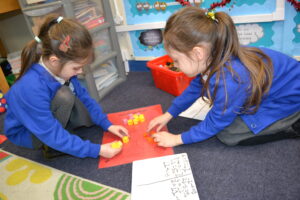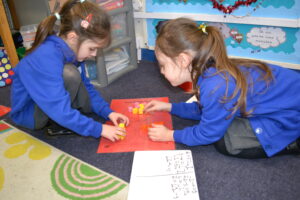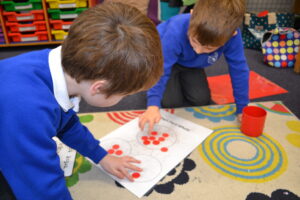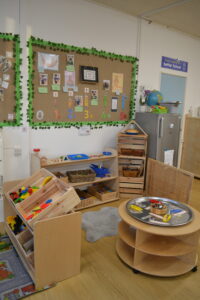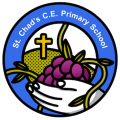Maths
Intent
At St Chad’s CE (C) Primary School, we believe in a mastery approach to learning. Mastery maths for us means we adopt the principles which ensure that all teachers believe all pupils can learn and enjoy mathematics. We aim to ensure that Mathematical learning behaviours are developed such that pupils focus and engage fully as learners who reason and seek to make connections.
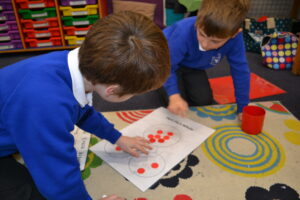 We as teachers continually develop our specialist knowledge for teaching mathematics, working collaboratively to refine and improve our teaching. Our curriculum is designed to ensure a coherent and detailed sequence of essential content which supports sustained progression over time.
We as teachers continually develop our specialist knowledge for teaching mathematics, working collaboratively to refine and improve our teaching. Our curriculum is designed to ensure a coherent and detailed sequence of essential content which supports sustained progression over time.
Our aim for all pupils is to develop a real passion for maths, to ensure children have automaticity of number and that they can apply their mathematical skills across subjects and in real life situations. We want children to develop key mathematical skills and see themselves as mathematicians who can apply maths to the wider curriculum. We believe in a language rich environment that ensures our pupils have the confidence to talk maths, do maths and apply maths to their everyday lives.
Due to the importance of maths in everyday life, we have invested heavily in, and committed to high quality CPD for our staff. In 2019, our maths lead undertook the Mastery Readiness program to fully prepare for the changes that needed to be made. We then enrolled on the NCETM Mastery Maths program where for 2 years we received high quality CPD from our Maths Hub lead. We are currently part of the Sustaining Mastery group whereby we support other schools and share best practice. Maths in St Chad’s has transformed over the last 4 years. Our staff are confident and feel empowered to deliver the maths curriculum and have the resources and support they need to achieve this.
The EYFS follow the NCETM Mastering Number curriculum for maths and supplement this with White Rose planning for shape. Both schemes have high expectations of all pupils and are a whole class approach to learning. 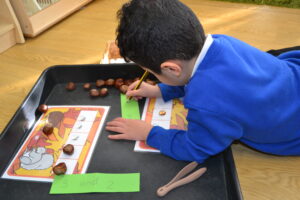 Once pupils leave the EYFS, they are confident in numbers within and up to at least 10 and can recall all related facts. The EYFS continuous provision also provides wider opportunities to access maths in the everyday play.
Once pupils leave the EYFS, they are confident in numbers within and up to at least 10 and can recall all related facts. The EYFS continuous provision also provides wider opportunities to access maths in the everyday play.
Our maths curriculum from Y1-6 follows White Rose which supports our whole school mastery approach. It is designed to spark curiosity and excitement and help children develop confidence in maths.
Teaching sequences are based on small steps to ensure a good level of coherence, understanding, application of understanding and transference of skills to a range of mathematic problems and contexts.
White Rose maps out a long-term plan based on 12 weeks in a term. At St Chad’s, we have tailored this scheme to suit our pupil’s needs by mapping out the actual weeks in a term and adding in extra units where needed including additional problem solving and extra units for consolidation or revisiting skills taught earlier on in the term. WRM gives us the flexibility to spend longer on key skills to ensure they are fully embedded before moving on to new learning.
- Each lesson begins with a revisit of previous learning in the form of a Flashback 4 (something from last year, last month, last week and the last lesson). This enables pupils to exercise their working memory and to ensure that previously taught skills become embedded in their long-term memory.
- A mental warm up is then completed that either links to work done in the last lesson or builds on the skills needed for the current lesson. The new lesson content is then introduced in the form of small steps and a ping pong style session. There are opportunities for guided and independent practice and concrete materials are carefully selected to ensure children can make visual links between what is being taught and what it looks like. Each slide takes the pupils through learning rapidly, but the small steps mean that pupils are learning together as a whole, following our school ethos of, ‘no child left behind’.
- Independent tasks are then explained, and the pupils complete their work at the level that suits them, starting on different questions depending on ability/confidence. The tasks are high ceiling low entry, so that everyone can access the first questions and then go as far through them as they can, completing the stretch and challenge activities if possible. We encourage all children to access problem solving and reasoning questions in each lesson to ensure they are challenged in different ways.
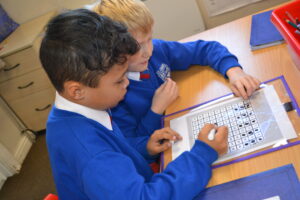
- We pre-teach key skills to small groups of children to ensure they can access the learning in the lesson and keep up with their peers.
- Teachers actively mark through the lesson to provide immediate feedback and targeted early intervention where needed. TAs do not sit with a group as we aim to ensure that all pupils develop independence. So, once they have introduced and supported certain pupils, they will leave them for independent practice and revisit them to monitor. TAs will also actively mark in class and provide immediate feedback to pupils and the teacher where needed.
- Mini plenaries are used effectively to address common misconceptions identified by active marking.
- End of lesson plenaries are usually in the form of whole class reasoning or ‘true or false’ style questions to enable the whole class to experience this level of reasoning.
- All teachers complete whole class feedback sheets to inform future planning and identify who may need reactive intervention or who may need to work in a smaller group the next day. We do not provide written feedback to pupils in books or expect this from staff, as research shows that verbal feedback at the time of the misconception is more beneficial to move learning forward. Pupils are encouraged to self-mark where appropriate and are expected to correct their mistakes which is shown in purple pen.
Assessment:
- Teachers and TAs actively assess daily and provide immediate feedback to move learning forwards.

- End of unit assessments are carried out from the White Rose scheme and supplemented with other activities where needed.
- We complete an NFER assessment at the end of each term which also feeds into our robust assessment process to inform/support our teacher assessment judgements.
- Termly moderation is carried out during whole school staff meetings
- The Maths lead moderates teacher assessment judgements termly and full reports are presented to governors.
- Book scans are carried out termly by the maths lead and support is put in place for any staff who need it in the form of coaching.
- Pupil conferences are held termly whereby the maths lead questions pupils on lesson content, opinion of the subject and gives opportunities for them to share their work.
- The maths lead analyses whole school data and NFER results on a termly basis with the SLT and ensures the correct pupils are accessing interventions.
- Termly pupil progress meetings are held to discuss pupils and lesson observations in maths by the maths lead are conducted once a term and support put in place if needed.
Extra opportunities:
- Some pupils may receive extra support to try to catch up/fill gaps from previously missed learning due to COVID or SEND. We have been working with our local maths hub to implement the ready to progress criteria in our small group interventions and we use the NCETM videos and resources to upskill our TA’s and to provide a structure for such interventions.

- Regular feedback on maths is given to parents/carers during our termly parents evenings and at the end of the year in their school report.
- Homework in maths begins in Y1 and increases gradually as the children move through school. Y6 pupils receive more maths homework in readiness for high school.
- ‘Barvember’ is completed each November during registration and maths work is celebrated in each classroom.
- We use Timetable Rockstars to ensure that times table facts are embedded in all year groups. This begins in Y1 and continue as the children progress through the school. We have weekly competitions which aim to incentivise the children to access the app regularly and we reward children for their effort and achievements which is celebrated in whole school assembly time.
We have seen yearly improvement in our greater depth results and our pupils are now increasingly stretched and challenged with the implementation of a mastery way of learning.
When observing maths in our school you will see a staff who are enthusiastic, engaging and confident maths teachers who empower their pupils to be the best versions of themselves. When you observe our pupils, you will hear them talking enthusiastically about their maths and speak about how they love the subject. You will hear them celebrating their mistakes and learning from each one they make. You will see a growth mind-set where they are not afraid to jump into the learning pit and struggle to get out – as they know that this is how they learn and make new neurological pathways. You will see a class enthused, engaged, challenged and on task. You will see independence and pupils supporting their peers and explaining tasks to one another. You will see a team, togetherness, and pupils who are loving learning, ready to use and apply their maths in their everyday lives.
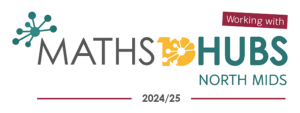
Class Activities Gallery:
